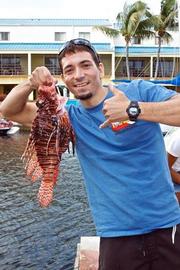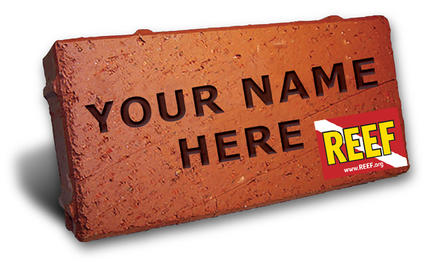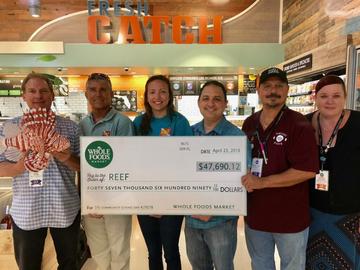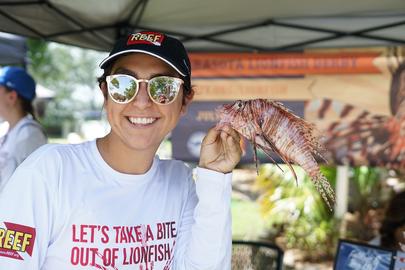More than sixty people gathered recently at the Fish House Encore in Key Largo, Florida, for Lionfish Food and Wine Night, a four course dinner with paired wines meant to introduce the light, white meat and delicious flavor of lionfish. And to give lionfish a taste of their own medicine.
Current search
Search found 418 items
- INVASIVE
$1,726 per person double occupancy ($2,146 single occupancy) - includes: lodging for 7 nights at the Kura Hulanda Lodge, breakfast each morning, 5 days of 2-tank boat dives, r/t airport transportation on Curacao, ground transportation for group activities, and all taxes.
+$200 REEF Program Fee per diver will be added to each package to cover the cost of the group leader, seminar and survey materials.
A diminutive, non-native damselfish (Neopomacentrus cyanomos) was recently discovered inhabiting coral reefs near Veracruz, Mexico—far removed from where it is native in the Red Sea and the Indo-Pacific. This publication, co-authored by REEF's Director of Special Projects, Lad Akins, evaluates the threat of establishment and spread in the invaded range.
REEF members are at the heart of our grassroots marine conservation programs. Over 60,000 divers, snorkelers, students, and armchair naturalists stand behind our mission.
This month we highlight Adam Nardelli. Adam has been a REEF member since 2009, and he served as a REEF Intern in 2014. He has conducted 54 surveys and has participated in several of REEF's programs. Here’s what Adam had to say about REEF:
When and how did you first volunteer with REEF or become a REEF member?
We are in the last few weeks of our summer fundraising campaign, and we need your help. Donations from our members are critical to REEF’s marine conservation efforts. In addition to supporting programs for marine biodiversity, fisheries management, and invasive species control, we are asking our members to make an extra donation this summer to help us build an Interpretive Center on the REEF Campus in Key Largo. Please help us continue to build our legacy of ocean conservation by being a part of this special campaign.
On Thursday, April 19, REEF partnered with Whole Foods Market® for 5% Community Giving Day. The event was a great success, resulting in more than $47,000 raised between nine Whole Foods Market locations throughout Broward and Palm Beach counties. These funds will go to benefit REEF’s many marine conservation projects, including the 2018 Lionfish Derby Series. REEF representatives were present at several of the participating store locations to spread awareness about invasive lionfish and other marine conservation efforts.
REEF’s 2018 Lionfish Derby Series presented by Whole Foods Market® is in full swing, and we are excited to share that so far, derby participants have already removed more than 1,770 lionfish from Florida's coastal waters this year! Thank you to everyone who has participated in this effort to combat invasive species. With the Palm Beach Derby happening this weekend at Loggerhead Marinelife Center, we will add even more lionfish to the current total.
Lionfish derbies and tournaments were first implemented in 2009 with the intent of increasing public awareness about the lionfish invasion in the western Atlantic, gathering specimens for research, and training volunteers to safely and effectively collect the venomous species. Since then, REEF has coordinated a series of derbies each year and assisted other organizations and groups in organizing and running their own derbies, resulting in the removal of tens of thousands of invasive lionfish.
Learn all about the invasive lionfish during this free, online workshop. Topics include background of the invasion, lionfish biology, ecological impacts, current research, and safe collecting and handling techniques.
Predation by the invasive Indo-Pacific lionfish impacts native fish populations within the Caribbean region and threatens to expand further into Brazil and the Mediterranean. Identifying the range-restricted native fish species with high predation vulnerability in these areas ahead of the invasion front combined with the knowledge of the time a lionfish population typically takes to reach dangerously high densities could help conservation planners attain positive outcomes and reduce biodiversity loss.





